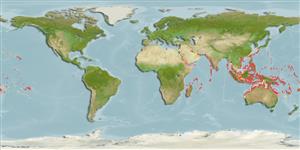Teleostei (teleosts) >
Gobiiformes (Gobies) >
Gobiidae (Gobies) > Gobiinae
Etymology: Amblygobius: Greek, amblys = darkness + Latin gobius = gudgeon (Ref. 45335).
More on author: Herre.
Environment: milieu / climate zone / depth range / distribution range
Ecology
Marine; reef-associated; depth range 1 - 30 m (Ref. 86942). Tropical; 35°N - 28°S, 32°E - 143°W
Western Indian Ocean: Maldives (Ref. 30829) and the Red Sea and Arabian Gulf (Ref. 11441). Pacific Ocean: Philippines to the Tuamoto Islands, north to Yaeyama Islands, south to Rowley Shoals, southern Great Barrier Reef and Rapa; Guam and Kapingamarangi in Micronesia.
Size / Weight / Age
Maturity: Lm ? range ? - ? cm
Max length : 10.0 cm SL male/unsexed; (Ref. 48637)
Dorsal spines (total): 7; Dorsal soft rays (total): 13 - 15; Anal spines: 1; Anal soft rays: 13 - 15. Characterized by having overall pale grey body color; head and body with pink stripes, most intense on head; dorsal fin base with row of 8-9 dark spots; first and second dorsal fin equal in height; slightly pointed caudal fin; longitudinal scale series 63-66; cycloid scales; head without scales; depth of body 4.7-6.4 in SL (Ref. 90102).
Solitary or in pairs (Ref. 90102). Common in areas with fine sand to muddy bottoms at the bases of inner lagoon and coastal reefs. Monogamous (Ref. 52884, 48637). Feeds on small invertebrates and organic matter (Ref. 89972).
Life cycle and mating behavior
Maturities | Reproduction | Spawnings | Egg(s) | Fecundities | Larvae
Monogamous mating is observed as both obigate and social (Ref. 52884).
Myers, R.F., 1991. Micronesian reef fishes. Second Ed. Coral Graphics, Barrigada, Guam. 298 p. (Ref. 1602)
IUCN Red List Status (Ref. 130435)
Threat to humans
Harmless
Human uses
Fisheries: commercial; aquarium: commercial
Tools
Special reports
Download XML
Internet sources
Estimates based on models
Preferred temperature (Ref.
123201): 25.1 - 29.3, mean 28.3 °C (based on 2853 cells).
Phylogenetic diversity index (Ref.
82804): PD
50 = 0.5000 [Uniqueness, from 0.5 = low to 2.0 = high].
Bayesian length-weight: a=0.01023 (0.00477 - 0.02194), b=3.02 (2.84 - 3.20), in cm total length, based on LWR estimates for this (Sub)family-body shape (Ref.
93245).
Trophic level (Ref.
69278): 3.0 ±0.2 se; based on size and trophs of closest relatives
Resilience (Ref.
120179): High, minimum population doubling time less than 15 months (Preliminary K or Fecundity.).
Fishing Vulnerability (Ref.
59153): Low vulnerability (10 of 100).
Nutrients (Ref.
124155): Calcium = 107 [58, 217] mg/100g; Iron = 0.762 [0.398, 1.384] mg/100g; Protein = 18.6 [16.7, 20.3] %; Omega3 = 0.159 [0.072, 0.276] g/100g; Selenium = 21 [11, 41] μg/100g; VitaminA = 153 [44, 470] μg/100g; Zinc = 1.74 [1.18, 2.57] mg/100g (wet weight);
